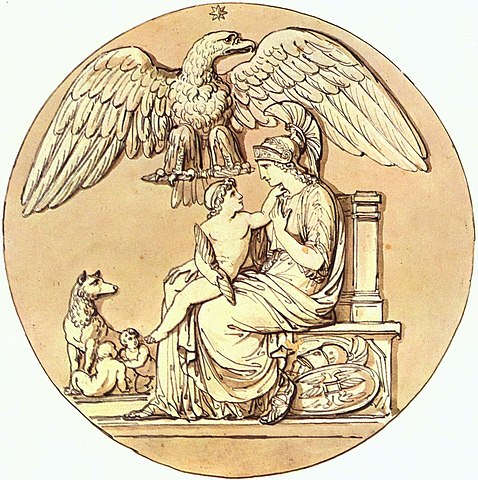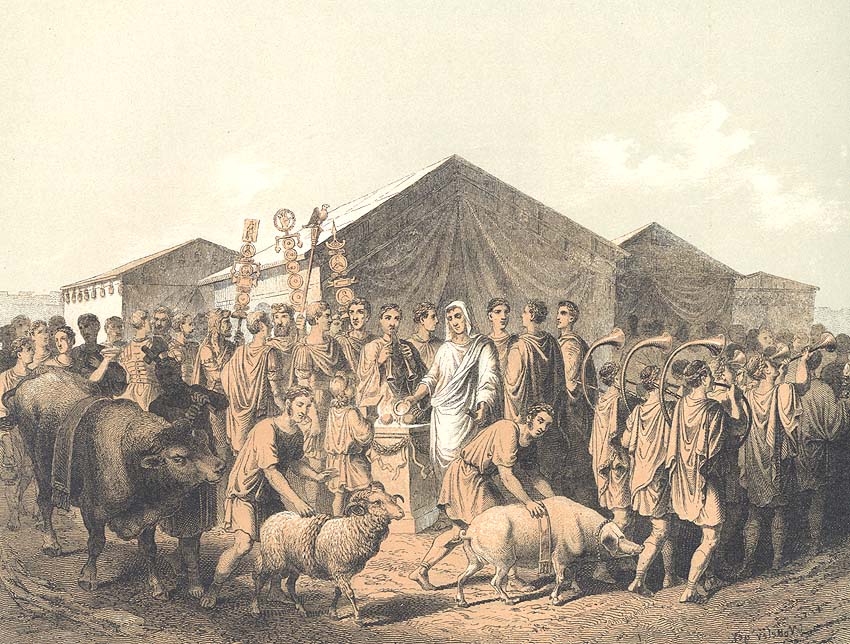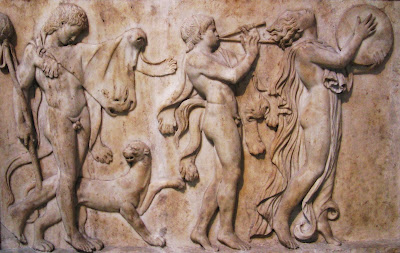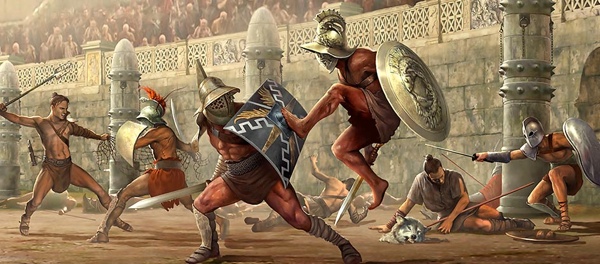The
Ludi Saeculares or Secular Games of the year
Domini were the first to be held in a world where the city of Rome was master and sovereign of all, arbiter of humanity's affairs, owner of all the wealth of the nations, as exemplified by the kings and queens who marched in Imperial triumphs and came to pour out libations to the deified personification of the
Res Publica, almighty
Roma. All of this sovereignty and might was now personified in the figure of the Republic's greatest consul and general Caesar Augustus, revered by them as
Optimus Maximus Invictus - the Best, the Greatest, the Undefeated - titles otherwise reserved for the King of the gods himself, Jupiter. The son of the greatest statesman and general to ever preside over the Senate and legions by a living goddess-Queen from the East, Caesarion presented himself clearly and indisputably as a supra-human, divine ruler: greater than his father by both birth and conquest, he was a new Romulus amongst them, and thus worthy of all acclaim and worship.
As it had been some time - more than a
Saeculum (110 year period) - since the last Ludi, the occasion naturally lent itself to some updating and innovation in adapting the old format to the realities and propaganda of the current regime. Four years prior Caesarion had taken over the cult of divine Rome himself, in his capacity as
Pontifex Maximus and chief of the Arval Brethren. This goddess presented herself as a form or type of Venus, who in her eastern guise of Aphrodite had lead her mortal son Aeneas to a new home in Italy (the seed from which the Republic had sprouted). He and his sycophants took to invoking her as
Isis of the Romans, associating her appeal not only with that of the increasingly popular cult of Isis, but with the propaganda of his parents: Julius, who claimed direct biological descent from Venus(-Aphrodite), and Cleopatra, who believed herself an earthly avatar of the goddess Isis(-Aphrodite) herself. Roma was thus Venus in her role as mother protectrix of the Roman Republic: Aphrodite and Isis the same goddess, in her Greek and Egyptian guises. This association was stressed by the nomination of Caesarion's wife as
Flaminica Isialis, to care for a new state-sponsored cult of Isis with assistance from the
Quindecimivires. And as it happened, the latter college of fifteen were the ones charged with the celebration of the Ludi Saeculares.
Before the Games themselves, heralds went around the city and invited the people to "
a spectacle, such as they had never witnessed and never would again". The quindecimviri sat on the Capitol and in the temple of Dea Roma in the Julian Forum, and handed out to the free citizens torches, sulphur and asphalt, to be burnt as a means of purification, harkening back to the purificatory rituals of the
Parilia, the anniversary of Rome's foundation. A Senatorial resolution ordered the end of all mourning and first fruit offerings of wheat, barley, and beans were made over the next five days: the altar of Dis Pater and Prosperina was also disinterred and offered sacrifices at night.
On the sixth day (May 31st) the Games began in earnest with a grand Imperial procession. The Emperor was accompanied by his wife
Livia Drusilla, their children and grandchildren[1], the ever-growing number of Roman nobles fortunate enough to call themselves
propinqui Augusti (Augustan kin) or
adfini Augusti (Augustan in-law), the Vestals, the consulars and the king-priests of Roma. From the Temple of Roma they proceeded to the Campus Martius, where the Emperor sacrificed 9 female lambs and 9 she-goats to the
Moerae (fates). To spectators Caesarion's role as the ultimate agent of destiny in human affairs would not have been forgotten[2]. Plays were presented and the Imperial consort and mother jointly presided over a
Sellisternia, a sacred banquet of 110 Roman matrons, for Isis and Magna Mater ("present" in the form of seated statues).
The following morning Caesarion and his sons sacrificed a bull to Jupiter; Latin plays were presented in a wooden theatre in the Campus Martius and another Sellisternia was held, this time for Juno and Roma. That evening saw further theatrical performances and a sacrifice by the Emperor, near the Tiber, of 27 sacrificial cakes to the
Ilithyiae (Greek goddesses of childbirth).
The third day (June 2nd) Caesarion and his sons sacrificed a cow to Juno Regina, after which Tiberius led the 110 matrons in prayer. That evening the Emperor again sacrificed near the Tiber - this time a pregnant sow, offered to Terra Mater; another Sellisternia followed. Like the Moerae and Ilythiae 'Mother Earth' was a deity of Greek extraction and without cult in the Roman state.
On June 3rd the Emperor and his sons sacrificed 27 sacrificial cakes to Roma and Isis; choirs of 27 boys and 27 girls sang the
Carmen Saeculare (composed for the occasion by the poet
Horace). This hymn was sung both on the Palatine and then on the Capitoline, but its words focus on the non-Palatine, non-Capitoline deities Venus and Isis, which were more closely associated with Caesarion. The hymn added a further level of complexity to the alternation of sacrifices between Greek and Roman deities by addressing the Greek deities under Latin names. The evening saw further theatrical performances, chariot races and trick riding, presented by
Cleopatra and in which the Emperor's son
Gaius excelled.
The key roles throughout were played by Caesarion and Tiberius, in their capacity as members of the quindecimviri; Caesarion participated alone in the night-time sacrifices but was joined by Tiberius and his younger sons for those during the day. Theatrical performances followed every sacrifice. There were additional games over the following week, with Latin plays presented in the Wooden theater near the Tiber and Greek stage plays in the Theater at the Circus Flaminius. Additional festivals and rituals such as the
Ludi Piscatorii (in honor of Father Tiber all fish caught that day were sacrificed by fire in the Temple of Vulcan) and the "birth days" of several Temples added to the hustle and bustle. The Games ended on the 12th with an animal hunt and circus games, after which the altar of Dis Pater and Prosperina was once again interred.
The Ludi Saeculares were followed immediately by the
Vincennalia, the celebration of Caesarion's twentieth year of rule. Whereas the Ludi focused primarily on appeasing chthonic deities without official state cults, the Vincennalia was more celebratory in nature and focused on the state-sponsored pantheon.
Celebrations began with the
Lusus Troiae ("Game of Troy") which traditionally celebrated "
a return from danger, a triumph of life over death". Pride of place was given to the
Salii, the "leaping priests" of Mars: twelve patrician youths dressed in archaic warrior dress, including Caesarion's sons Gaius and
Maecenas and grandsons
Tiberillus and
Germanicus, who made a procession round the city, dancing and singing the
Carmen Saliare. They were then joined by other equestrian youths of high birth in the Circus Maximus: divided into three
turmae or squadrons of twelve, they performed interweaving drills and mock battled in an intricate display of Roman skill.
The following day the Emperor and his mother supervised over a
lectisternium, a meal offered to propitiate the gods and goddesses. The twelve
Dii Consentes (the Roman equivalent of the Olympians[3]) were presented alongside an additional divine couple: his father the Divine Julius and Roman Isis. The feast lasted for eight days, and was also celebrated by private individuals. The citizens kept open house, quarrels were forgotten, debtors and prisoners were released, and everything done to banish sorrow. Gladiatorial combats, chariot racing and various sumptuous displays of Imperial wealth followed - mock battles atop camels, Imperial promenades aboard elephants and public distribution of copious amounts of bread and wine. If the many visiting Kings and chiefs had yet to be fully convinced of Rome's superiority and her Emperor's might, Caesarion was determined to not allow them to return home with so much as a drop or hint of uncertainty.
[1] Excluding Livia Valeria, still in exile, but including the children of her brother Drusus.
[2] Similar to Zeus, who was at times called Leader or Bringer of the Fates, the personification and executor of their abstract power.
[3] Jupiter, Juno, Neptune, Minerva, Mars, Venus, Vulcan, Vesta, Mercury, Ceres, usually coupled in this order.






